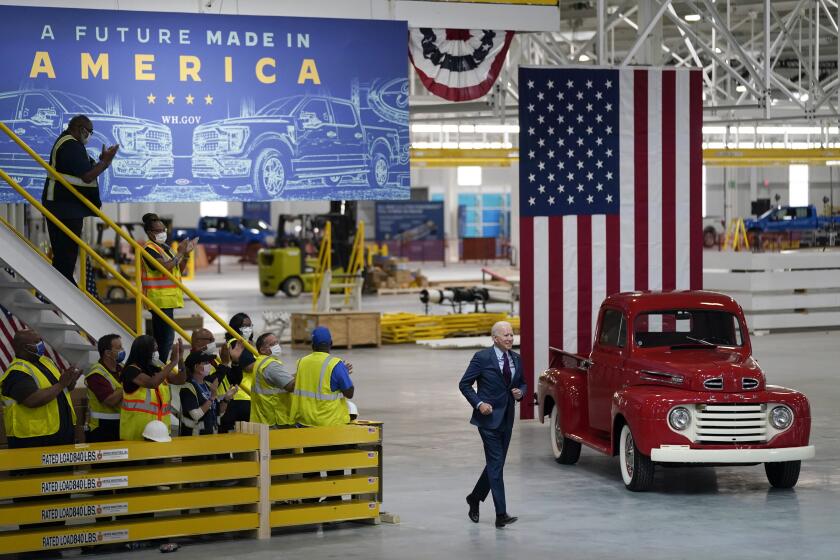Critics are blasting Biden for taking ‘a destructive California idea national’ for gig workers. Here’s what he really did

- Share via
WASHINGTON — San Francisco’s city attorney last month reached the kind of settlement many gig workers have been seeking for years: An app-based hospitality company called Qwick agreed to reclassify thousands of bartenders, servers and dishwashers as employees, giving them back wages and, for the first time, sick pay and other legal benefits.
But advocates’ dream that such settlements would spur new deals for gig workers across the country appears to be on hold. The San Francisco settlement, the first of its kind, applies only to Qwick’s workers in California, which has one of the most aggressive gig worker protections in the country.
President Biden’s promise to replicate California’s law at the national level has fallen victim to congressional gridlock and industry clout. This week, his Labor Department began enforcing a new administrative rule outlining which employees should be classified as gig workers. But industry experts say it amounts to a half-measure that falls short of California’s protections and is unlikely to result in the same type of benefits for the increasing number of Americans who rely on contract work to pay their bills.
That hasn’t stopped critics from claiming that Biden’s action “takes a destructive California idea national,” as a commentary in the National Review recently proclaimed, or that the president is “spreading California’s war on gig workers to rest of country,” as a Republican senator wrote for Fox News. In reality, experts say Biden’s new rule essentially restores the federal approach to gig work that was in place under President Obama.
Even California’s groundbreaking 2019 law, known as Assembly Bill 5, has faced headwinds, including an industry-backed ballot initiative in 2020 that severely limited the ability to force Uber, Lyft and delivery companies to treat their drivers as employees. San Francisco has ongoing suits against Uber and Lyft and has settled cases with DoorDash and Instacart for more than $5 million each, but only for the period before the initiative.
“We’re certainly appreciative of the Biden administration efforts in this space, but understand these are very challenging conversations,” said San Francisco City Atty. David Chiu, referring to the industry’s political clout.
Workers at Qwick, an Arizona-based company that operates in California, use an app to fill shifts in restaurants and catering halls but do the same work as servers, dishwashers and baristas who are directly employed by the same establishments. As part of the settlement, Qwick agreed to pay $1.5 million in back wages and $250,000 in penalties, as well as set aside $350,000 for a sick leave bank.
Biden has put unions at the center of policy — as vehicles to rebuild middle-class jobs and address climate change and racial and gender inequity.
For labor advocates, the most important aspect of the settlement is that the workers will be classified as employees, giving them rights to full overtime, wages and benefits, the first known time a modern gig company has agreed to such a reclassification, according to Veena Dubal, a law professor at UC Irvine.
Qwick will test a new procedure for collecting payroll taxes from California workers as part of a larger effort to change its practices in the state, the company said in a statement.
“The future of work is evolving, and our goal is to lead that evolution by providing innovative opportunities that empower our freelancers,” said Dana Barbeau, Qwick’s chief legal and people officer.
Biden was an early and enthusiastic backer of California’s law, winning labor union endorsements in part because of his promise to pursue similar protections at the national level. He disparaged the effort to exempt rideshare companies when the ballot measure known as Proposition 22 was approved in 2020.
“All workers deserve the right to bargain for good wages, benefits and working conditions — including gig workers,” he tweeted in 2019. “That is why I’m pleased the CA Legislature passed AB5. As president, I will enact a federal law to ensure gig workers get the full protections they deserve.”
Biden has been one of the most overtly pro-union presidents in generations, walking the picket line with autoworkers last year and requiring union labor on multibillion-dollar projects in his signature climate and infrastructure legislation. But he has been unable to pass labor’s top policy initiative, a bill that would make it easier to organize unions and would also include more significant rules against classifying gig workers as independent contractors.
Without congressional approval, Biden instead used his executive authority to write a new Labor Department rule. The rule more clearly states how companies should classify workers, using a variety of factors, including whether the employee is economically dependent on a business and whether that business has control over the worker.
President Trump had rolled back similar rules in place under prior administrations, curtailing the Labor Department’s enforcement efforts. Biden’s rule essentially restores the status quo before Trump, according to experts.
A new poll shows California’s reputation battered by its high cost of living and by partisanship — half of Republicans say the state isn’t really American
The Labor Department said in a statement that the rule “provides helpful guidance for both employers and workers, using a consistent approach” to classify workers.
But even Biden’s modest efforts have met with resistance from industry allies.
Sen. Bill Cassidy of Louisiana, the top Republican on the Senate committee overseeing labor, accused acting Labor Secretary Julie Su of trying to dismantle the gig economy, imposing the rule change to force more workers into “large labor unions who want more workers paying forced union dues.” The issue is key to stalling approval of Su, who previously served as California’s labor secretary, for the permanent post at the federal level.
Uber spent $2.5 million in direct congressional lobbying last year; Lyft, $1.35 million; DoorDash, $1.85 million; and Amazon, $19.8 million, according to OpenSecrets, a nonpartisan group that tracks corporate influence. Those figures do not include money spent on public relations campaigns and at the state level. The industry spent nearly $200 million in support of Proposition 22 in California.
Uber and Lyft did not respond to requests for comment. In a statement on its website, Uber said the new Biden rule “does not materially change the law under which we operate, and will not impact the classification of the over one million Americans who turn to Uber to earn money flexibly.”
The statement noted that the rule does not apply the standard used in California and several other states to determine a worker’s status. That standard presumes workers are employees unless the employer can meet a three-part test, including that their duties take place outside the normal course of business.
Gig companies argue that they might have to cut jobs and that workers would lose flexibility if they were classified as employees. The U.S. Chamber of Commerce, which opposes California’s law, pointed to a George Mason University study comparing California employment statistics with less regulated states, suggesting California workers in affected fields had lower employment numbers.
Lynn Rhinehart, a longtime official with the AFL-CIO who worked in the Biden administration until November, said the new federal rule would help workers and businesses clarify their roles, “but it’s not AB 5” — a change that would have been challenged in court if enacted without congressional approval.
The impact of the more modest rule will depend on enforcement. Many of the gig companies have made class-action lawsuits virtually impossible because they have forced arbitration clauses that require employees to resolve civil complaints individually.
Even Labor Department enforcement at the national level can have limited effect because it is concerned only with wages and overtime, rather than sick leave and other benefits. The federal minimum wage, $7.25, has not increased since 2009.
Only states and localities would be able to require higher wages. And only five other states employ the same standard for classifying contract workers as California for most types of employees (more states use the standard for construction workers and for determining unemployment benefits).
“What frustrates me in general is the inability, or the lack of political will, to pursue cases” against employers who misclassify their workers as freelancers, said Lorena Gonzalez, who wrote AB 5 while serving in the Legislature and now leads the California Labor Federation.
The federal rule change will have little effect on California, where workers have stronger protections, but will matter more in less labor-friendly states, she said. “A more standardized approach nationally is a good thing. I’d like it to be stronger, but we’re not unhappy.”
Construction workers, janitors, home health aides and other blue-collar workers classified as contractors are losing out on as much as $16,700 a year compared with what they would have made as regular employees, according to a study last year by the Economic Policy Institute, a left-leaning, pro-union think tank.
“This goes to this larger change in the whole economy. We have so many areas of the economy where there’s been an outsourcing of work,” said David Weil, who worked in labor rules enforcement in the Obama administration and advocated for protections for gig workers. Like Su, his bid for a similar job in the Biden administration was held up in the Senate because of objections from Republicans and a handful of Democrats. “Jobs that were formerly thought of as employment are being treated as independent contractors.”
More to Read
Sign up for This Evening's Big Stories
Catch up on the day with the 7 biggest L.A. Times stories in your inbox every weekday evening.
You may occasionally receive promotional content from the Los Angeles Times.













